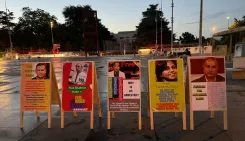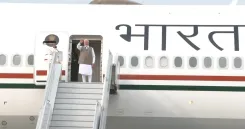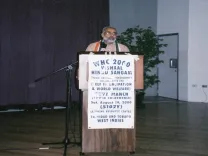Are Radical Islamists Trying to Transform Bangladesh into a Taliban-like State?

Synopsis
Key Takeaways
- Jamaat–Char Monai alliance aims to implement strict Sharia law.
- Women's rights and minority protections are under threat.
- Awami League raises concerns about the interim government's silence.
- Rising extremism has led to violence against minorities.
- Recent statistics reveal alarming human rights violations.
Dhaka, July 3 (NationPress) The radical Islamic coalition known as the Jamaat–Char Monai alliance has made a bold declaration to reshape Bangladesh in the image of Taliban-led Afghanistan. This includes implementing bans on women participating in public life, enforcing burqas, restricting the rights of minorities, and promoting jihadi training across the nation, according to the Awami League's statement on Thursday.
The Awami League highlighted a distressing interview conducted by US-based Bangladeshi journalist Khalded Muhiuddin, where the leader of the Islamic Movement, Muhammad Faizul Karim, detailed this alarming vision for an Islamic governance model amidst the rising extremism under the interim government led by Muhammad Yunus.
During the interview, radical leader Karim asserted that if they succeed in the upcoming national elections, the Islami Andolan Bangladesh will implement Sharia law across the country.
He further stated that Bangladesh would adopt the governance style currently seen in Afghanistan, along with the 'positive philosophies' from Iran.
Karim also claimed, 'If we assume power, Hindus will be granted rights under the Sharia law that we plan to establish.'
The Awami League raised concerns about the interim government's apparent silence on these alarming developments, questioning whether it was due to negligence or a calculated complicity.
As the party expressed their concerns over recent events, they asked if the attacks on temples, disruptions of worship, assaults on women, and the decline of secularism were the intended outcomes of the so-called 'July Movement.'
Extremism has escalated in Bangladesh since the removal of former Prime Minister Sheikh Hasina in August last year. Under the Yunus administration, numerous radical factions have turned to violence, specifically targeting minority communities in the region.
Analysts believe that these extremist groups previously collaborated with student leaders and Yunus to dismantle the democratically elected government led by Hasina.
On Tuesday, the Awami League presented statistics detailing human rights abuses in Bangladesh, describing the nation as being in a state of 'brutal anarchy' and citing various incidents of violence, including rape, lynchings, and unidentified deaths, characterizing the country as a 'blood-stained nation' under the Yunus-led interim government.
The party underscored that the events of last month revealed a total breakdown of 'safety, justice, and leadership' under the Yunus regime.
According to the Awami League's findings, June alone saw 63 reported incidents of rape, including 17 gang rapes, with seven survivors being women or girls with disabilities, and 19 children and 23 teenage girls being victimized. Additionally, there were 39 reported cases of sexual harassment and 51 physical assaults against women.









